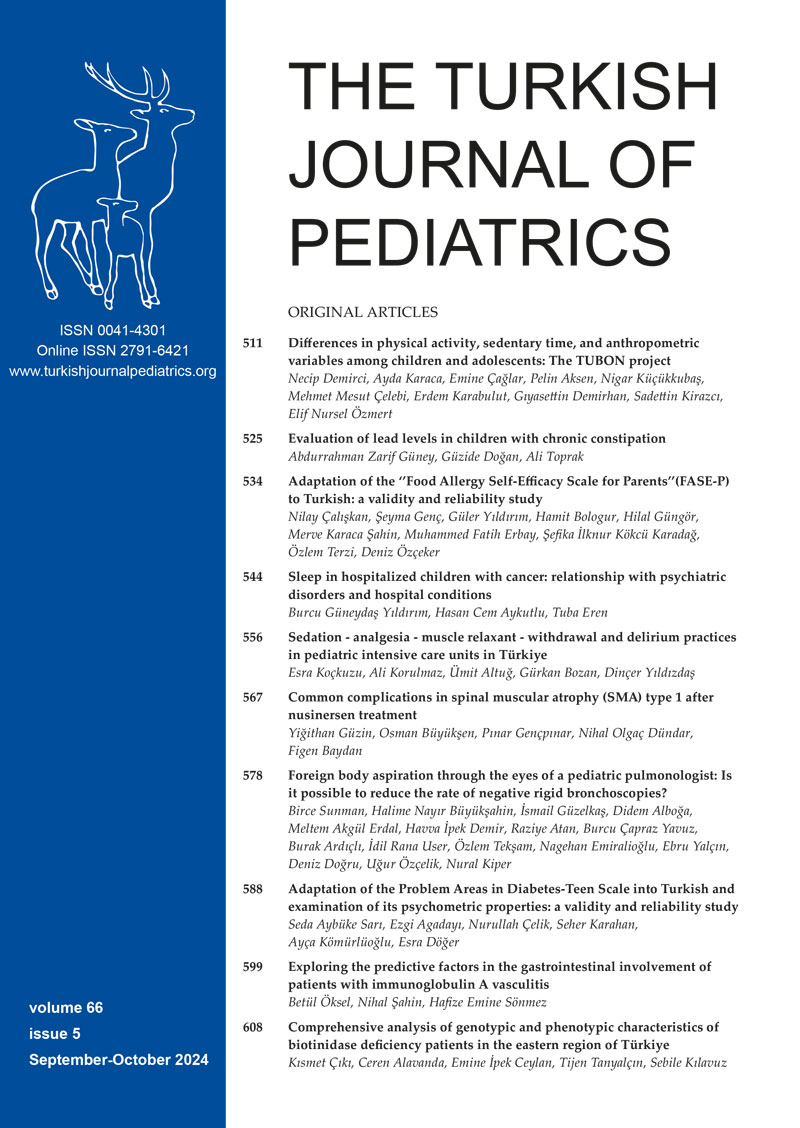Abstract
Background. Iron refractory iron deficiency anemia (IRIDA) is a rare autosomal recessive type of anemia characterized by unresponsiveness to oral iron therapy and partial response to parenteral iron therapy. In this article, we report the clinical presentation of four patients with IRIDA admitted to our clinic, including their laboratory values at admission and after oral and parenteral iron treatment, and the analysis of their mutation(s) in TMPRSS6 gene.
Case. Four patients from different families, aged between 3 and 14 years, two girls and two boys, two of whom were from consanguineous marriages, who were diagnosed with iron deficiency anemia in primary health care institutions and referred to our clinic because of inadequate response to oral iron treatment were included. Patients were evaluated for the differential diagnosis of microcytic, hypochromic anemia and investigated for the etiology of IDA. Homozygous or compound heterozygous mutations causing defective matriptase-2 protein expression were detected in the TMPRSS6 gene; these mutations included four frameshift mutations-two of which were the same in two cases and causing premature terminal stop codons-and a nonsense mutation, all of which were previously demonstrated in the literature. The response to parental iron therapy ranged from complete non-response to mild to good response in hemoglobin levels, but none of the patients showed improvement in iron parameters.
Conclusions. Increased awareness of IRIDA and keeping it in mind in the differential diagnosis in the presence of hypochromic microcytic anemia that does not respond to iron treatment will be crucial in improving the diagnosis and treatment of the disease and ultimately enhancing the quality of care for affected individuals.
Keywords: iron refractory iron deficiency anemia, IRIDA, TMPRSS6, parenteral iron
References
- Miller JL. Iron deficiency anemia: a common and curable disease. Cold Spring Harb Perspect Med 2013; 3: a011866. https://doi.org/10.1101/cshperspect.a011866
- Camaschella C. Iron deficiency. Blood 2019; 133: 30-39. https://doi.org/10.1182/blood-2018-05-815944
- Mattiello V, Schmugge M, Hengartner H, von der Weid N, Renella R, SPOG Pediatric Hematology Working Group. Diagnosis and management of iron deficiency in children with or without anemia: consensus recommendations of the SPOG Pediatric Hematology Working Group. Eur J Pediatr 2020; 179: 527-545. https://doi.org/10.1007/s00431-020-03597-5
- Beutler E, Gelbart T, Lee P, Trevino R, Fernandez MA, Fairbanks VF. Molecular characterization of a case of atransferrinemia. Blood 2000; 96: 4071-4074.
- Cotter PD, Rucknagel DL, Bishop DF. X-linked sideroblastic anemia: identification of the mutation in the erythroid-specific delta-aminolevulinate synthase gene (ALAS2) in the original family described by Cooley. Blood 1994; 84: 3915-3924.
- Finberg KE, Heeney MM, Campagna DR, et al. Mutations in TMPRSS6 cause iron-refractory iron deficiency anemia (IRIDA). Nat Genet 2008; 40: 569-571. https://doi.org/10.1038/ng.130
- De Falco L, Totaro F, Nai A, et al. Novel TMPRSS6 mutations associated with iron-refractory iron deficiency anemia (IRIDA). Hum Mutat 2010; 31: E1390-E1405. https://doi.org/10.1002/humu.21243
- Folgueras AR, de Lara FM, Pendás AM, et al. Membrane-bound serine protease matriptase-2 (Tmprss6) is an essential regulator of iron homeostasis. Blood 2008; 112: 2539-2545. https://doi.org/10.1182/blood-2008-04-149773
- Silvestri L, Guillem F, Pagani A, et al. Molecular mechanisms of the defective hepcidin inhibition in TMPRSS6 mutations associated with iron-refractory iron deficiency anemia. Blood 2009; 113: 5605-5608. https://doi.org/10.1182/blood-2008-12-195594
- Heeney MM, Finberg KE. Iron-refractory iron deficiency anemia (IRIDA). Hematol Oncol Clin North Am 2014; 28: 637-52, v. https://doi.org/10.1016/j.hoc.2014.04.009
- Ganz T, Nemeth E, Rivella S, et al. TMPRSS6 as a therapeutic target for disorders of erythropoiesis and iron homeostasis. Adv Ther 2023; 40: 1317-1333. https://doi.org/10.1007/s12325-022-02421-w
- De Falco L, Sanchez M, Silvestri L, et al. Iron refractory iron deficiency anemia. Haematologica 2013; 98: 845-853. https://doi.org/10.3324/haematol.2012.075515
- Sharma A, Kumar A, Saha PK, Saha L. The role of TMPRSS6 gene polymorphism in iron resistance iron deficiency anaemia (IRIDA): a systematic review. Ann Hematol 2024; 103: 1085-1102. https://doi.org/10.1007/s00277-023-05576-w
- Camaschella C. How I manage patients with atypical microcytic anaemia. Br J Haematol 2013; 160: 12-24. https://doi.org/10.1111/bjh.12081
- Camaschella C. Iron-deficiency anemia. N Engl J Med 2015; 372: 1832-1843. https://doi.org/10.1056/NEJMra1401038
- Yılmaz Keskin E, Yenicesu İ. Iron-refractory iron deficiency anemia. Turk J Haematol 2015; 32: 1-14. https://doi.org/10.4274/tjh.2014.0288
- DeLoughery TG. Iron deficiency anemia. Med Clin North Am 2017; 101: 319-332. https://doi.org/10.1016/j.mcna.2016.09.004
- Çakmaklı S, Kaplan Ç, Uzunoğlu M, et al. A novel homozygous nonsense mutation (p.Y78*) in TMPRSS6 gene causing iron-refractory iron deficiency anemia (IRIDA) in two siblings. Turk J Pediatr 2020; 62: 103-108. https://doi.org/10.24953/turkjped.2020.01.014
- Wang CY, Meynard D, Lin HY. The role of TMPRSS6/matriptase-2 in iron regulation and anemia. Front Pharmacol 2014; 5: 114. https://doi.org/10.3389/fphar.2014.00114
- Du X, She E, Gelbart T, et al. The serine protease TMPRSS6 is required to sense iron deficiency. Science 2008; 320: 1088-1092. https://doi.org/10.1126/science.1157121
- De Falco L, Silvestri L, Kannengiesser C, et al. Functional and clinical impact of novel TMPRSS6 variants in iron-refractory iron-deficiency anemia patients and genotype-phenotype studies. Hum Mutat 2014; 35: 1321-1329. https://doi.org/10.1002/humu.22632
- Lehmberg K, Grosse R, Muckenthaler MU, et al. Administration of recombinant erythropoietin alone does not improve the phenotype in iron refractory iron deficiency anemia patients. Ann Hematol 2013; 92: 387-394. https://doi.org/10.1007/s00277-012-1618-8
- Sal E, Keskin EY, Yenicesu I, Bruno M, De Falco L. Iron-refractory iron deficiency anemia (IRIDA) cases with 2 novel TMPRSS6 mutations. Pediatr Hematol Oncol 2016; 33: 226-232. https://doi.org/10.3109/08880018.2016.1157229
- Donker AE, Schaap CC, Novotny VM, et al. Iron refractory iron deficiency anemia: a heterogeneous disease that is not always iron refractory. Am J Hematol 2016; 91: E482-E490. https://doi.org/10.1002/ajh.24561
Copyright and license
Copyright © 2024 The Author(s). This is an open access article distributed under the Creative Commons Attribution License (CC BY), which permits unrestricted use, distribution, and reproduction in any medium or format, provided the original work is properly cited.















